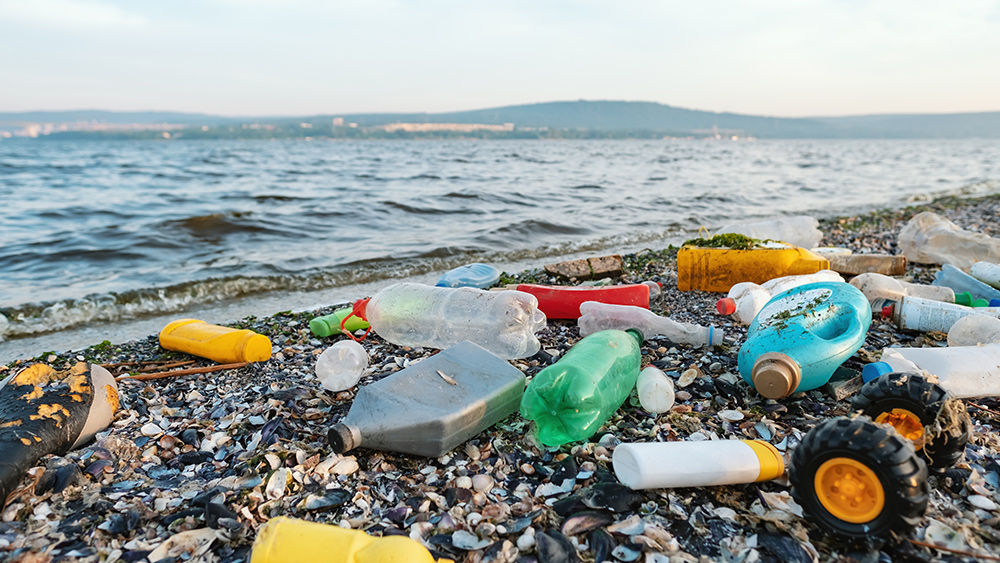
However, a shocking report from Greenpeace and the International Pollutants Elimination Network (IPEN) revealed that plastics contain toxic chemicals that can enter products and interact to create new harmful substances during the recycling process.
The report comes as negotiators from over 180 nations meet in Paris this year to discuss a global plastics treaty and develop regulations to address the plastic pollution crisis.
Capping plastic production still a major point of debate
According to estimates, plastic production is on track to triple by 2060. Plastic can harm human health and the environment throughout its lifecycle from creation to disposal.
At least 58 countries, all part of a group called the High Ambition Coalition to End Plastic Pollution, are calling for a treaty to slow plastic production. But scientists and advocates say that industry groups and countries that profit from plastic production want to focus on waste management and recycling instead.
Speaking at a High Ambition Coalition briefing, Jose Fernandez, undersecretary of State for Economic Growth, Energy and Environment, explained that even though plastics manufacturing remains one of the largest industries in America, the country is still committed to a treaty with "strong binding provisions, not only voluntary actions."
While the U.S. is not a member of the coalition, it is calling for a treaty to direct nations to develop individual action plans.
Melanie Bergmann, a biologist at the Alfred Wegener Institute and a member of the Scientists' Coalition for an Effective Plastics Treaty, said current plastic recycling systems "mold this unknown cocktail of potentially harmful substances together." Bergmann was not speaking on behalf of the coalition.
This potent chemical cocktail can harm workers and communities near recycling sites. The Greenpeace and IPEN report also revealed that the chemicals can leach from recycled plastic products.
Dangerous chemical additives in plastic
Despite the alleged benefits of recycling, only nine percent of plastic waste is recycled while the rest is burned in incinerators and left to pollute nature. The bulk of plastic waste that doesn't get recycled are sometimes thrown away in landfills located in low and middle-income countries.
Scientists and advocates say that increasing recycling isn't a practical solution. Plastics contain toxic chemicals, such as bisphenols (like BPA), phthalates and per- and polyfluoroalkyl substances (PFAS).
Additionally, plastic can absorb chemicals from other products in the waste stream, like pesticides and pharmaceuticals, which can eventually leach out of the plastic and contaminate the surroundings.
Both IPEN and Greenpeace suggest that limiting plastic production and removing toxic chemicals added to plastics can help make safe recycled products feasible.
Fossil fuels are the raw materials used to make plastic, and over 13,000 chemicals are added to change plastic's durability, flexibility, color, UV protection and more.
But according to a report from the UN Environment Program, at least 3,200 of those chemicals are considered a "concern for human health," while an additional 6,000 have never been screened.
Bjorn Beeler, international coordinator at IPEN, said using 6,000 chemicals "with no data is like driving blind." (Related: Report: Plastic production set to TRIPLE by 2050, exposing many to toxic particles and chemicals.)
Various chemicals added to plastics are associated with many health risks such as hormonal system disruptions, cancers and reproductive harm.
Reducing plastic production and consumption key to preventing further environmental damage
One solution to the plastic issue requires the simplification and transparency of ingredients in plastics. Bergmann believes that lists of approved and unsafe chemicals could guide production and improve the safety of the end material.
Additionally, full transparency could help improve current recycling methods and reduce the risk of creating new toxins.
Bergmann says a cap on plastic production is "the single most important measure" that can be implemented to resolve the issue.
A statement from the High Ambition Coalition echoes Bergmann's sentiments, with the group saying the treaty must reduce plastic production and consumption.
Sir Molwyn Joseph, Antigua & Barbuda's minister of health, wellness and the environment, explained that "addressing the unsustainable sourcing and extraction of raw materials to make plastics" can also help significantly.
At the same time, developing countries contribute little to the plastic pollution crisis but unfairly suffer the most from the impact of plastic waste.
Joseph warned that there is a very small window to solve and halt the severe damage being done by plastics to the environment and to human health.
The mandate for the treaty was agreed upon in March 2022 and is currently in the second of five-week discussions spread across three years. The first meeting about the treaty in late 2022 focused on procedures for the talks, and the most recent discussion centered on substantive issues.
Some countries, including China, India, Russia and Saudi Arabia, have held up talks with procedural issues, opposing the possibility of a vote on a final treaty if consensus can’t be reached. These are the countries that profit substantially from the production of fossil fuels, petrochemicals and plastics.
Beeler said he hopes to see an objective to protect the environment and human health from adverse impacts at all stages of the plastic lifecycle.
Jeanne d’Arc Mujawamariya, Rwanda’s minister of environment, said the treaty has been in discussion for over a year. Since then, over 400 million tons of new plastic have been produced and another 22 million tons of plastic waste have polluted nature, highlighting the need for the immediate completion of the treaty.
Watch the video below to know more about how plastic pollution is filling the world with plastic.
This video is from the Smile For Science channel on Brighteon.com.
More related stories:
Study: 74 Metric tons of microplastics present in coastal New Zealand city’s atmosphere.
Sources include:
Please contact us for more information.






















